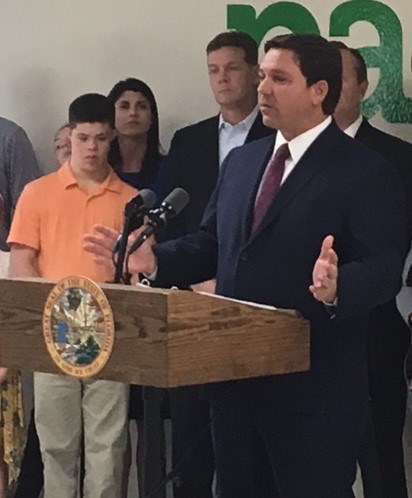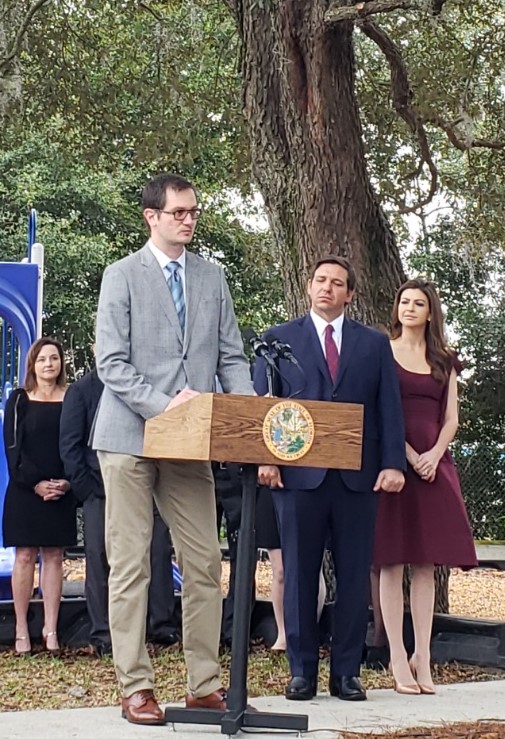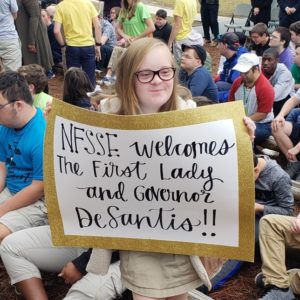
Florida Gov. Ron DeSantis speaking today at Pace Brantley School outside Orlando, with Andy and Camille Gardiner and their son, Andrew
ORLANDO – Florida Gov. Ron DeSantis reiterated his pledge to end the waitlist for special needs children who have qualified for a state-funded scholarship at a second school visit Monday.
Following a morning stop at North Florida School of Special Education in Jacksonville, DeSantis traveled to Pace Brantley School in Longwood, outside Orlando.
Pace Brantley, a private school situated on a sprawling, 9-acre campus, specializes in educating children with a variety of special needs including attention deficit disorder, dyslexia and other learning disabilities.
“As long as I’m governor, don’t worry about the Gardiner scholarship,” DeSantis told a group of more than 50 parents, students and educators. “We’re going to be here and support it. We’ll stand behind the parents and students, because we believe in you. You have a lot to offer this state.”
The governor was accompanied by former Florida Senate President Andy Gardiner, Gardiner’s wife, Camille, and their son, Andrew. Gardiner led the legislative effort to establish the program to honor Andrew, who has Down syndrome.
“What’s special about the scholarship is that it allows parents to (steer) their child’s education,” Gardiner said. “Whenever they’re told that their child has a unique ability, they can know the governor and First Lady supports them.”
Nearly 1,900 Florida students are on the waiting list for the scholarship in the wake of a demand that has outpaced state funding. Administered by the nonprofit Step Up For Students, which hosts this blog, the scholarship serves nearly 12,000 special needs students.
Karen Revels, whose 6-year-old son Chancellor is on the waitlist, was among those who attended the event. Revels is paying about $12,000 a year out of pocket for Chancellor, who is on the autism spectrum, to attend Walden Community School in Winter Park.
She described Walden’s environment as calming, praising the smaller class sizes and Chancellor’s opportunities to “play and wiggle” and eat lunch outdoors.
“It is not chaotic at all, and his behavior issues at home have almost been eliminated,” Revels said. “He is happy to go to school, there isn’t pent-up anxiety and anger anymore, and it is all because of his daily environment.”
Revels said the family is depending on the Gardiner Scholarship to keep Chancellor in the setting that works best for him – a small private school.
“Academically, he is at the top of his class, and now he is also there emotionally,” she said. “Our other two children have thrived in a public-school setting, but it is not a one-size-fits-all model by any means.”
Another attendee, Ashley VanHees of Longwood, said she is grateful for the scholarship. Her son, Camden, 8, was developing normally until he was bitten by a tick at age 2. Within hours, he suffered a seizure and brain swelling. He eventually was diagnosed with a traumatic brain injury due to Lyme encephalitis.
VanHees said Camden is still fighting Lyme disease but has made exceptional strides, thanks in part to the Gardiner Scholarship. He is now a second-grader at Advance Learning Academy in Fern Park.
“We were able to enroll Camden in a private school where he has thrived and shown remarkable improvement,” she said. “His IQ scores have increased by 20 points and that is just the beginning. We know that we have a long road ahead, but we feel confident in our journey knowing that we have the support from the scholarship to assist along the way.”
VanHees said she can’t imagine how the family would manage without the scholarship.
“I do know that this great education he is currently receiving would be out of reach,” she said. “My hope is that all of the families and children that remain on the scholarship waitlist are able to receive the opportunities that we have benefited from.”

Adam Blaszkiewicz, a parent on the Gardiner Scholarship waitlist, speaks to the gathered crowd at North Florida School of Special Education, flanked by Gov. and First Lady DeSantis.
JACKSONVILLE – Florida Gov. Ron DeSantis on Monday promised to eliminate the wait list for children who have qualified for a state-funded scholarship for students with special needs.
DeSantis, flanked by First Lady Casey DeSantis and Florida Education Commissioner Richard Corcoran, visited the North Florida School of Special Education where he addressed parents of students awaiting a Gardiner Scholarship, the nation’s largest education savings account program, as well as those families who have benefited from it.
“In the budget just released, I’ve allocated enough money to get rid of the waitlist for the Gardiner Scholarship entirely,” DeSantis told the crowd of roughly 150. “The Gardiner program has been a proven success, and parents need to find the right environment for their kids.”
DeSantis said he looks forward to welcoming in the next school year the nearly 1,900 Florida students currently on the list in the wake of a demand that has outpaced state funding. Administered by the nonprofit Step Up For Students, which hosts this blog, the scholarship serves nearly 12,000 special needs students.

A student at the North Florida School of Special Education holds a sign greeting the governor and first lady.
Families can use the funds to pay for a variety of educational services, including private school tuition, tutoring and therapies, in addition to contributions to the Florida Prepaid College Program. The scholarship has enjoyed broad bipartisan support since its inception in 2014 and was expanded in 2015 to include students on the autism spectrum, who now account for 66 percent of scholarship recipients.
Corcoran praised all who champion education opportunities for Florida’s youth.
“Human dignity comes from a great education, and everyone deserves that,” he said.
Adam Blaszkiewicz, whose son Robert is a second-grader at North Florida School of Education, was one of several parents who spoke at the event. Blaszkiewicz recently moved to Florida from North Carolina and is paying out of pocket – about $7,000 for half a year – while his son remains on the waiting list.
“This program provides parents with both means and flexibility to address their children’s needs,” Blaszkiewicz said. “More importantly, it ensures that parents do not have to face a gut-wrenching decision of foregoing or delaying an intervention that could change their child’s life for the better.”
Like many parents of special needs students, Blaszkiewicz is aware that timing is critical for children like Robert.
“Those funds (would) not only allow us to place our children in an educational setting where they are most likely to succeed as early as possible, but they also free up our personal budgets to provide additional therapy services, as well as help us plan and save for the future,” he said.
Tim Crass, whose son Drew has attended North Florida School of Education for three years on the scholarship, said it has been instrumental in helping Drew, who has Down Syndrome, stay “up to speed” in school. The roughly $10,000 scholarship pays for about two-thirds of Drew’s tuition.
“The Gardiner Scholarship is a win-win for both the families who want to send their children to North Florida and the school itself, as it has been able to grow and accommodate even more students,” Crass said. “Without the Gardiner Scholarship, families who need schools like North Florida wouldn’t be able to get the education for their children that they truly deserve, and schools like North Florida wouldn’t be able to continue providing the amazing educational experience they are providing today.”
The Rev. Jose Suarez, founder and director of Hope Youth Ranch in Hudson, said after the event that the governor’s announcement “was like a breath of fresh air.”
“It just brings hope,” Suarez said. “Our parents have to make decisions on whether to use their own money. This opens up a lot of doors for possibility and relief, not just schooling but therapies as well -- the total needs of their child.”
UPDATE: Gov. DeSantis continued his Gardiner Scholarship tour in the afternoon, speaking at Pace Brantley School in Orlando. You can read our coverage of that event HERE.
By Scott Kent and Donna Winchester
Some people just can’t take “no” for an answer.
Among them are administrators at hundreds of Florida private schools that are providing free and reduced tuition to thousands of students on the waiting list for the Florida Tax Credit Scholarship.
A case in point: Sunrise Academy in Orange City, a preK-12 school that enrolls 157 students. Founder and president Yahayra Marte, who describes Sunrise’s philosophy as “leave no one behind, like the military,” has waived tuition for 42 students. She’s reduced fees for another 15 students.
Marte estimates that Sunrise has taken a $312,000 financial hit, which has necessitated sacrifice – the school had to postpone a scheduled pay increase for its teachers. While the response to assisting wait-list students has been “unbelievable, extraordinary,” Marte is hoping she can make up the shortfall next year.
Enrollment in the FTC, the nation’s largest scholarship program for economically disadvantaged K-12 students, dropped this fall for the first time in 14 years. (Step Up For Students, a nonprofit that administers the scholarship, hosts this blog.) The Florida Department of Education reported that as of November, the scholarship was serving 99,453 students in 1,799 private schools. That’s 7,505 fewer than the same period last year, and 8,645 fewer than last year’s total.
The decline was caused by a slowdown in corporate contributions and has led to a gap between scholarship supply and family demand. Under the scholarship law, companies that contribute to approved nonprofit scholarship organizations receive a 100 percent credit against six different state taxes. From 2010 to 2017, tax-credited contributions grew annually by about 25 percent. Last year, that rate fell to 16 percent.
This school year, through December, contributions have increased by only 4 percent, matching the pace at which the values of the scholarships rose. As a result, nearly 13,000 students landed on a waiting list because there weren’t enough funded scholarships to go around. And that figure likely understates the unmet demand.
Step Up For Students had received 170,096 scholarship applications before shutting down the online application system June 29. Step Up president Doug Tuthill projects the nonprofit would have served about 70,000 more students if it had the funds.
Many private schools that accept FTC students, like Sunrise Academy, have stepped into the breach. Of 433 FTC-eligible schools who responded to a Step Up For Students survey, 234 said they have waived tuition for students on the waiting list, and 271 said they have provided reduced tuition; many are doing both.
The schools come in all sizes, from Masters Preparatory School in Hialeah with 245 students, 90 of whom are wait-list students who have received free or reduced tuition, to Pensacola Junior Academy with 33 students, six of whom have been accommodated financially.
Overall, the survey shows that 1,276 waiting list students have had their tuition waived; 1,507 have benefitted from reduced tuition. That’s more than 2,700 scholarship-eligible students who are attending a school of choice they otherwise would not be attending.
Many schools are making an enormous financial sacrifice, in some cases forgoing hundreds of thousands of dollars in revenue. Most view the commitment to students not in monetary terms, but as a mission.
“It’s my heart’s desire to see them do well,” said Donna Lee Buckner, founder and principal at Lakeland Institute for Learning. “That’s the bottom line and the motivation for it all.”
The school, which serves special needs students with cognitive impairments and those with limited proficiency in English, has an enrollment of 70. Buckner waived tuition for 40 wait-list students and offered reduced tuition for 25 others this year. She estimates the school is subsidizing between $150,000 and $200,000 in tuition.
“If we didn’t do this, it would be a hardship for most of these parents,” Buckner said. “I do ask them to donate a certain number of hours back to the school to help us offset the cost of some of our services.”
Help could be on the way. At a Martin Luther King Jr. Day speech Monday at Piney Grove Boys Academy in Lauderdale Lakes, Gov. Ron DeSantis pledged to work with lawmakers to find a solution to the problem.
“I would like to eliminate the wait list so that every parent has the ability to make these choices,” he said. “And that will be a priority for me in this next legislative session.”
DeSantis has allies in the Legislature.
When asked at a luncheon Wednesday at the James Madison Institute in Tallahassee about the education agenda for this year’s session, Senate Education Committee Chairman Manny Diaz, R-Miami, referenced the governor’s desire to ensure that “no child at that poverty level should be on a waitlist” adding, “Philosophically, we are aligned. The stars are aligned, and we may never see this again.”
Diaz’s counterpart in the House, Education Committee Chairman Jennifer Sullivan, R-Mount Dora, also a guest at the luncheon, said that lawmakers would accommodate students not currently being served “at a minimum.”
Which should be good news for schools going above and beyond to assist waitlist families but whose efforts can be sustained for only so long.